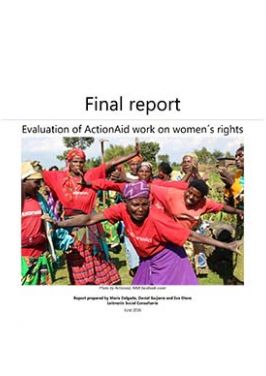Evaluation of ActionAid work on women's rights
An evaluation of ActionAid's women's rights programmes in Cambodia and Rwanda, and how ActionAid is contributing to shifting power in favour of women.
Executive summary
ActionAid is coming to the end of its current 2012-2017 strategy period so during 2016 they will be evaluating a variety of initiatives; including programmatic work and country strategies framed within an overall Taking Stock Review. This evaluation feeds into the Taking Stock process by reflecting on how ActionAid is contributing to shifting power in favour of women.
Thematically, the evaluation is limited to assessing the shift in power generated by ActionAid programming on their Strategic Objective 1 (livelihoods) and their Strategic Objective 5 (women’s rights). For SO1 this evaluation explores how ActionAid has mainstreamed women ́s rights into their work related to the right to land and livelihoods, and access to control over productive resources. For SO5 the evaluation team have undertaken an in-depth analysis of whether and how ActionAid has contributed to the shifting power in favour of women in their programming work around Violence Against Women and Girls (VAWG) and around economic justice.
Geographically, the evaluation focuses on two LRPs (Local Rights Programmes) in Kampong Thom in Cambodia and in the Nyanza District in Rwanda. These two LRPs were selected by ActionAid’s M&E Unit after consultations among relevant staff from the Programme team and the Cambodia and Rwanda country offices. LRPs selection criteria included: a) their ability to provide useful learning on the issues detailed above; b) LRPs with solid women rights/livelihoods programming where learning on methodologies and approaches could be gathered; c) LRPs working on SO1 & SO5 for a reasonable period of time (5 years); d) practical considerations, such as accessibility.
The specific aim of this research is helping ActionAid and other stakeholders to understand the extent to which they have contributed to transform gender relations to benefit women in Kampong Thom and in Nyanza, including what strategies/approaches are working and why. In this sense the main users of this evaluation process are; a) women’s groups involved in the LRPs that will use this evaluation process to reflect on their own processes of empowerment and better understand effective strategies for bringing about changes in their communities; b) ActionAid in Cambodia and Rwanda and their partners; to learn how their work has helped shifting power in favour of women in Kampong Thom and Nyanza and showcase their work within the forthcoming ActionAid strategy development process; c) ActionAid International senior management, programme and M&E staff; to inform the future strategy development and methodologies for analysing and measuring shifts in power.
